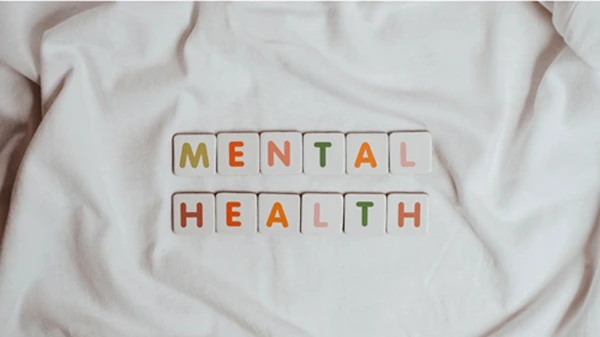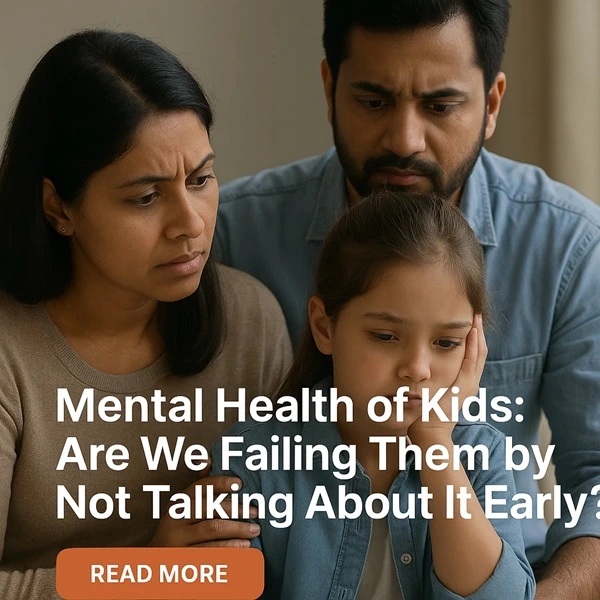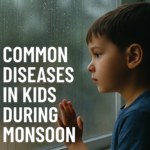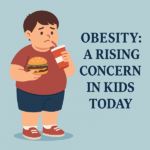“DAD, why does my friend always win and I don’t?”
It was a simple question from my 8 year old son but it hit me like a truck. That night, I didn’t google how to raise a topper or how to make my child more competitive. I googled, “How to talk to kids about failure without breaking their spirit.”
That one question became a wake up call.
As parents, we spend so much time preparing our children for spelling bees, sports events, and school exams. But how often do we prepare them for life?
Not just for the medals, but for the missed chances.
Not just for the praise, but for the pressure.
Not just to win, but to stay grounded when they lose.
In a world where competition is cutthroat and expectations rise like skyscrapers, mental strength is no longer a luxury, it’s a necessity. And that strength begins with conversation.

Why Conversations About Mental Health of Kids Must Begin Early
Children are not too young to understand emotions, they feel deeply, even when they don’t always have the words. Suppressing those feelings is like ignoring a toothache. It won’t disappear; it will only fester.
When we talk to our kids early about stress, fear, anger, anxiety, and pressure, we teach them that:
- It’s okay to feel.
- It’s okay to ask for help.
- It’s okay to not be okay.
These are not weaknesses. These are signs of emotional intelligence, something no math book or coding class can teach.
Why Mental Health of Kids is the New Intelligence For Them
Grades matter. Achievements count. But resilience? That’s what gets you through the storm.
Think about it:
- The future will have more AI, automation, and competition than ever.
- Kids won’t just need marks; they’ll need mindfulness, adaptability, and grit.
- Emotional wellbeing will be just as critical as IQ, if not more.
Teaching them early how to handle setbacks is no longer optional, it’s survival training.
Why Mental Health of Kids Should Be in School Curriculum Not Just Parenting 101 Thing
Schools teach algebra and grammar. Great. But what about:
- Coping with peer pressure?
- Dealing with bullying?
- Handling rejection or exclusion?
Mental health education should be embedded into early education just like physical health. A weekly class. An open conversation. A safe outlet.
Because kids often spend more time with teachers than parents, and if no one talks to them at either place, they internalize pain in silence.
How to Prepare Kids for Future Competition (Without Breaking Them)
We don’t want our kids to crack under pressure, right? But here’s the paradox, we become the pressure. Constant comparison, endless tuition classes, back to back schedules, it’s too much.
Instead, let’s do this:
1. Teach them process over outcome
Celebrate effort, not just results. Praise how they studied, not just that they topped.
2. Build healthy routines
Sleep. Nutrition. Free play. These are not luxuries. They’re fuel for mental balance.
3. Create safe spaces for dialogue
At dinner. During bedtime stories. In car rides. Ask them,
“What was tough about your day today?”
“What made you smile?”
Make it normal to talk, not just when something is wrong.
Talking About Failure: Why This Is the Toughest Yet Most Needed Conversation
If your child thinks failure = shame, they’ll do one of two things:
- Hide their struggles from you.
- Stop trying altogether to avoid disappointment.
That’s heartbreaking.
Instead, tell them:
- “I failed too.”
- “Failing means you’re trying.”
- “Some things take longer, and that’s okay.”
Don’t just tell them stories of Elon Musk’s success.
Tell them about when he failed. Tell them about your failures too. That’s what makes you real, not robotic.
Appreciate Effort Not Just Outcome
You know that drawing your child made that wasn’t perfect? Frame it.
That football match they lost? Get them ice cream.
Why?
Because if we only appreciate success, they’ll grow up thinking love is conditional. That they are only worthy if they perform.
But if we appreciate effort, they learn that their value isn’t tied to medals, it’s tied to their character.
Motivation That Lasts: Teach Them How to Bounce Back
The world won’t go easy on them. That’s the truth. But we can make them mentally equipped:
1. Affirmation > Comparison
Use phrases like:
- “You’re improving.”
- “You didn’t give up.”
- “You tried your best, and that’s what champions do.”
2. Growth Mindset > Fixed Mindset
Teach them that intelligence and talent can be developed.
Failure doesn’t mean “I can’t.” It means “I haven’t yet.”
3. Tools to Build Emotional Strength
- Journaling
- Talking to trusted adults
- Mindfulness exercises
- Hobby time (yes, it heals more than therapy sometimes)
4. Real Life Examples You Can Share
- Thomas Edison failed over 1,000 times. We remember him for the lightbulb.
- J.K. Rowling was rejected by 12 publishers. She still wrote Harry Potter.
- You — Yes you have bounced back from tough times. Tell your kids that story.
Let’s Be the Parents Our Kids Need
Not the loudest.
Not the strictest.
Not the result obsessed.
Let’s be the parents who:
- Notice when our child is unusually quiet.
- Celebrate the small wins.
- Accept their fears without mocking them.
- Say “I’m here, no matter what.”
For more such Parenting Tips, please follow Popnewsblend.com.
Final Thoughts on Mental Health of Kids: Raising Kids for Real Life, Not Just Report Cards
The goal isn’t to raise perfect kids.
The goal is to raise resilient, happy, grounded humans who know how to:
- Try
- Fail
- Heal
- Get up again
And that begins with one simple habit: Talk. Listen. Repeat.
Because mental health isn’t just an adult thing. It’s a human thing. And childhood is where it begins.
Mental Health Of Kids : Frequently Asked Questions (FAQ)
1. Why is mental health of kids important at an early age?
Mental health lays the foundation for a child’s emotional, social, and cognitive development. When addressed early, kids learn how to manage stress, express emotions, and build healthy relationships, all of which are critical life skills that shape their future.
2. How do I know if my child is struggling with mental health issues?
Look out for these signs:
- Sudden withdrawal or silence
- Anger or irritability
- Changes in appetite or sleep
- Low confidence or frequent “I can’t” statements
- Avoiding school, activities, or friends
Trust your instincts, if something feels off, it’s okay to gently ask and start a conversation.
3. Can young children really understand conversations about mental health?
Yes! While they may not understand complex terminology, they definitely feel emotions. Even toddlers can understand basic words like “sad,” “angry,” or “worried.” Teaching them emotional vocabulary helps them navigate their feelings in a healthy way.
4. How can I talk to my child about failure without discouraging them?
Normalize failure as a part of growth. Use statements like:
- “It’s okay to mess up, that’s how we learn.”
- “What did this teach you?”
- “Even adults make mistakes.”
Share your own stories of setbacks and how you bounced back. This makes you more relatable and helps them feel safe.
5. What role does appreciation play in a child’s mental well being?
Appreciation reinforces self worth. When kids are only praised for winning or being the best, they tie their value to performance. But when you appreciate effort, kindness, or persistence, they grow into confident, emotionally balanced individuals.
6. How do I prepare my child for future competition without overpressuring them?
Balance is key. Teach them:
- To set personal goals, not just beat others
- That learning is more valuable than ranking
- That consistent effort matters more than instant success
Encourage discipline, but don’t turn every activity into a race. Let them enjoy the journey too.
7. Why should schools include mental health education in their curriculum?
Because kids spend a huge part of their day at school. If mental health is taught like math or science, it becomes normalized. It gives children tools to cope, express, and ask for help, especially if they can’t open up at home.
8. What are some daily practices to build mental resilience in kids?
- Encourage them to journal or draw their feelings
- Use affirmations: “I am strong,” “I am learning,” etc.
- Create routines with time for rest and play
- Teach problem solving through real life examples
- Model healthy emotional behavior yourself
9. Should I take my child to a therapist if I suspect something’s wrong?
Absolutely, just like you’d see a doctor for a fever. Mental health professionals can guide both you and your child without stigma. Early intervention often prevents deeper issues later in life.
10. What if my child refuses to talk about their feelings?
Be patient. Don’t force it. Instead:
- Use creative outlets like drawing, storytelling, or games
- Create “check-in” rituals (like bedtime talk or dinner table chats)
- Avoid judgment, let them know they can talk when they’re ready
Sometimes, just being there silently is all the comfort they need.
11. Is it okay to talk about stress or anxiety in front of kids?
Yes, if done right. Instead of hiding everything, share how you manage your own stress. Say things like:
- “I had a tough day, so I’m taking a few minutes to breathe.”
- “Sometimes I feel nervous too, but I remind myself I’ll be okay.”
This teaches kids that emotions are normal and manageable.
12. How can I help my child stay motivated during tough times?
- Remind them of past challenges they’ve overcome
- Break big tasks into smaller goals
- Celebrate small wins
- Avoid toxic positivity, acknowledge when things are tough, then move forward with them
13. Is too much praise harmful?
It depends what you’re praising. Over praising for every little thing can reduce the value of praise itself. Focus more on praising effort, improvement, and attitude, not just outcomes.
14. Can mental health struggles in childhood affect adult life?
Yes. Unresolved stress, anxiety, or trauma can impact confidence, relationships, and even career success. But the good news is early conversations, support, and healthy habits can build lifelong resilience.
15. What’s the biggest mistake parents make when it comes to kids’ mental health?
Ignoring it or assuming “they’re too young to worry.” Mental health isn’t a teenage issue, it starts forming from age 3. Talking early, listening often, and creating a safe space can prevent lifelong emotional challenges.

Hi, I’m Prashant Jain — a curious soul, storyteller, and content creator at heart.I’ve always been drawn to the world of entertainment, travel, sports, health & lifestyle — not just as a writer, but as someone who genuinely lives these experiences. Whether I’m binge-watching the latest OTT series, exploring offbeat spiritual destinations in India, or diving deep into wellness routines and cricket match insights, I love sharing what I discover with like-minded readers.
PopNewsBlend is my way of blending personal journeys with meaningful stories — ones that inform, inspire, and keep you ahead of the curve. Everything I write comes from real observations, hands-on experiences, and a deep passion for understanding the world around us.
Discover more from Popnewsblend
Subscribe to get the latest posts sent to your email.








Your point of view caught my eye and was very interesting. Thanks. I have a question for you.